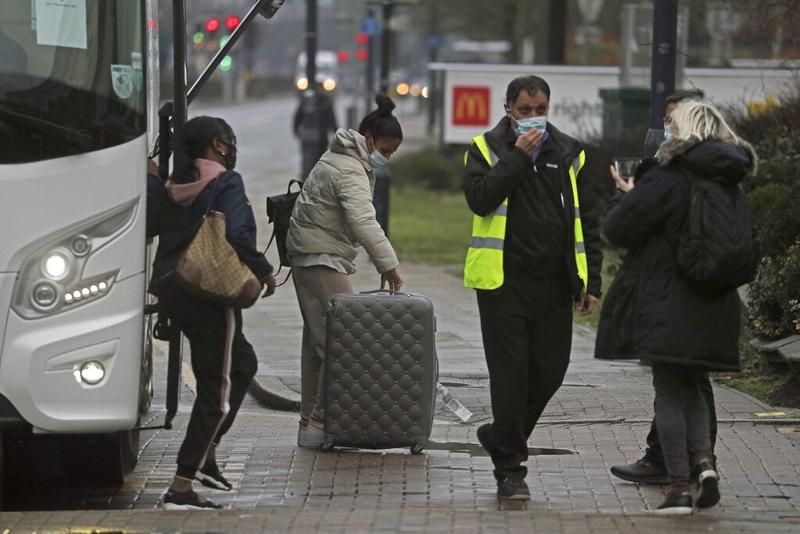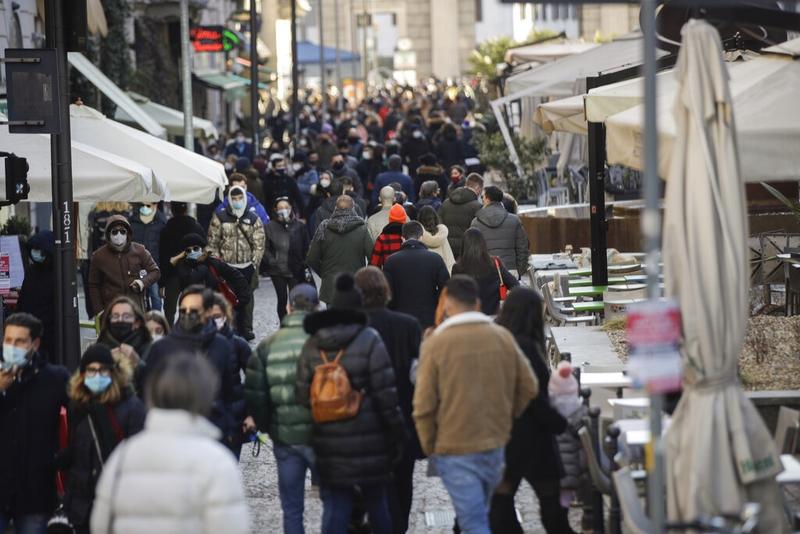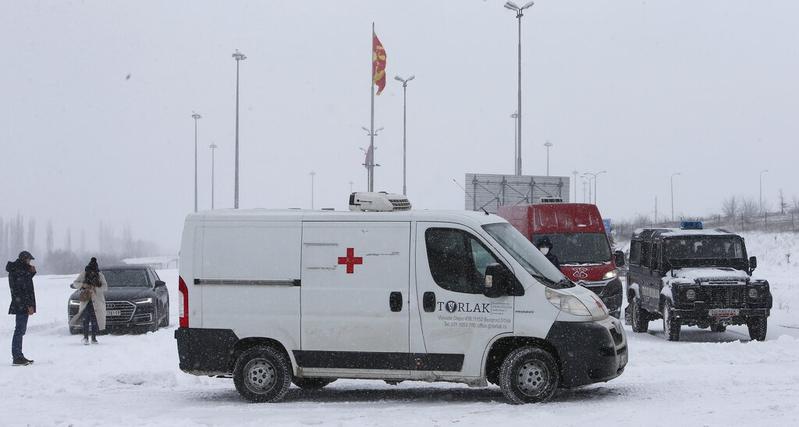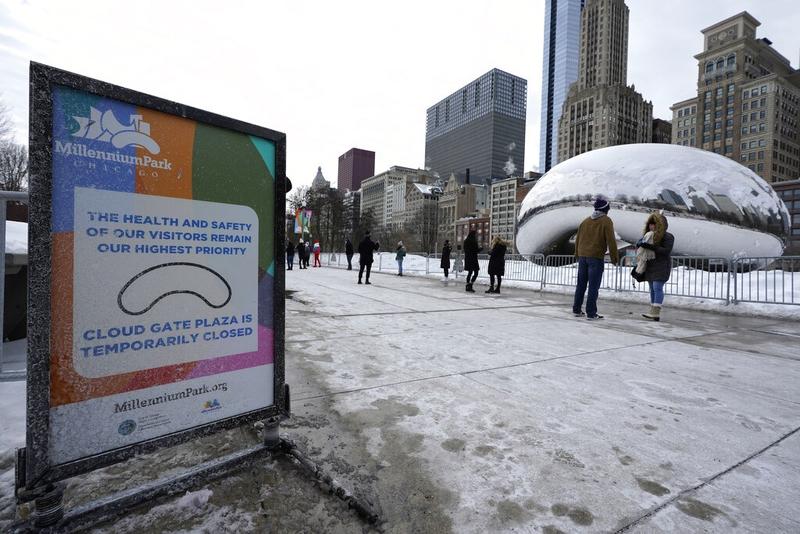 Passengers alight a bus that delivered them to the Radisson Blu Edwardian Hotel, near Heathrow Airport in London, where they will remain during a 10 day quarantine period after returning to England from one of 33 "red list" countries. On Feb 15, 2021. (STEVE PARSONS / PA VIA AP)
Passengers alight a bus that delivered them to the Radisson Blu Edwardian Hotel, near Heathrow Airport in London, where they will remain during a 10 day quarantine period after returning to England from one of 33 "red list" countries. On Feb 15, 2021. (STEVE PARSONS / PA VIA AP)
ROME / LONDON / SAO PAULO / PARIS / MEXICO CITY / LIMA / ADDIS ABABA / KIGALI / BUENOS AIRES / HAVANA / QUITO / ALGIERS / TIRANA / BERLIN / JOHANNESBURG / MOSCOW - British Prime Minister Boris Johnson will judge this week how fast England can exit COVID-19 lockdown after vaccinating 15 million of its most vulnerable people, but the health minister said death and hospital admission numbers were still too high.
Johnson praised what he called an “extraordinary feat” and said that England had already met a target set earlier this year of immunizing the top four priority groups, including the over 70s, by Feb 15. Wales also confirmed reaching the threshold. More than 25 percent of the adult population has now received at least one shot.
With nearly a quarter of the United Kingdom’s population now inoculated with a first dose of a COVID vaccine in a little over two months, Johnson is under pressure from some lawmakers and businesses to reopen the shuttered economy.
In a letter, a group of 63 MPs said there was “no justification” for not lifting all COVID-19 restrictions by the end of April, when the government hopes to have vaccinated everyone over the age of 50.
Foreign Secretary Dominic Raab signaled on Sunday that schools in England will be allowed to reopen from early next month.
The British government reported 10,972 new COVID-19 cases and another 258 deaths, bringing the tally to 4,038,078 and the death toll to 117,166, according to official figures released Sunday.
Passengers arriving in England from Monday from any of 33 “red list” countries will have to spend 14 days quarantined in a hotel room under new border restrictions designed to stop new variants of the coronavirus.
Countries on the red list include South Africa and Brazil - both of which have seen variants of the virus that could reduce the efficacy of existing vaccines.
READ MORE: Oxford to test vaccine response among children for first time
Global tally
Coronavirus cases worldwide have exceeded 108.7 million while the global death toll toppep 2.39 million, according to data compiled by Johns Hopkins University.
Africa tally
The number of confirmed COVID-19 cases recorded on the African continent reached 3,740,297 as of Sunday, the Africa Centers for Disease Control and Prevention (Africa CDC) said, adding that the death toll stood at 98,187.
Zimbabwe
A plane carrying Zimbabwe’s first coronavirus vaccines, 200,000 doses donated by China, arrived in the capital Harare on Monday.
A further 600,000 doses from China are set to arrive in early March, Information Minister Monica Mutsvangwa said last week. It is unclear how much the cash-strapped southern African nation will pay for the second batch of the vaccines from China National Pharmaceutical Group (Sinopharm).
Zimbabwe’s Vice-President Constantino Chiwenga, head of the delegation receiving the vaccines that included the finance minister, said frontline health workers would be the first to be vaccinated.
The country has so far reported close to 35,000 confirmed cases of the virus and nearly 1,400 deaths.
Germany
The number of confirmed coronavirus cases in Germany increased by 4,426 to 2,338,987, data from the Robert Koch Institute (RKI) for infectious diseases showed on Monday.
The reported death toll rose by 116 to 65,076, the tally showed.
Russia
Russia reported 14,207 new COVID-19 cases on Monday, including 1,818 in Moscow, taking the national infection tally to 4,086,090 since the pandemic began.
Russia’s coronavirus taskforce said 394 people had died in the last 24 hours, pushing the official national death toll to 80,520.
 People walk along Corso Como street in Milan, Italy, Feb 14, 2021, amid the coronavirus pandemic. (LUCA BRUNO / AP)
People walk along Corso Como street in Milan, Italy, Feb 14, 2021, amid the coronavirus pandemic. (LUCA BRUNO / AP)
Italy
Administering the AstraZeneca COVID-19 vaccine to those aged up to 65 would not be wrong, given the delays in supplies to Italy, the head of national medicines agency AIFA said on Monday.
AIFA recommended “preferential use” of the vaccine for those between 18 and 55. But other nations such as France, Germany and Portugal raised the maximum age for vaccine recipients to 65.
In order to avoid a third wave, keep down variants and limit contagion, Palu added that social distancing rules must be followed for the next two to three months, with school and university re-openings pushed back until the situation is better.
Italy reported 11,068 new coronavirus cases and 221 deaths on Sunday, bringing the country's cumulative tally to 2.72 million with 93,577 fatalities.
Italy extended its ban on ski resorts, set to expire on Monday, until March 5, Ansa reported. The action was taken by Health Minister Roberto Speranza after warnings from a senior aide as well as Italy’s Scientific Committee that the spread of new coronavirus variants made the reopening of resorts too risky, despite the overall easing of outbreak in Italy and a loosening of other restrictions.
Brazil
Brazil has confirmed two cases of the UK variant in the state of Goiás after sequencing test samples taken on Dec 31, according to the state’s health department.
In a statement on Friday, the authorities said the two people who have caught the UK variant live on the outskirts of the federal capital Brasília.
The health department did not say if these are the first cases of the UK variant found in Brazil. It referred questions to the health hinistry, which did not have an immediate comment on Sunday.
The people who caught the variant had contact with a relative who lives in England, traveled to Brazil for the holidays and had been diagnosed with COVID-19, the Goiás health department said.
Brazil recorded 24,759 new coronavirus cases in the past 24 hours, along with 713 more deaths from COVID-19, the ministry said on Sunday.
Brazil has registered more than 9.8 million cases of the virus since the pandemic began, while the official death toll has risen to 239,245, according to ministry data.
Iceland
A push by Iceland to get Pfizer’s backing for a nationwide study on the ability of vaccines to quickly create herd immunity has run into an unexpected snag. The tiny island nation has done too good a job keeping COVID-19 in check.
Before Christmas, Kari Stefansson, the head of Iceland-based deCode Genetics, and Thorolfur Gudnason, the country’s chief epidemiologist, reached out to Pfizer executives. Their pitch: If Iceland could quickly get 500,000 doses of the Pfizer-BioNTech SE vaccine, the country could inoculate about 70 percent of its population by the end of March, creating the basis of a real-life study on whether herd immunity can be achieved as a result.
But it wasn’t to be, according to the two men. As new infections declined, Pfizer came to the conclusion that there were too few cases in Iceland to support such a study, they said.
More than 14,500 people, or about 4 percent of Iceland’s population, have already received one or two doses of either the Pfizer vaccine, or the shots produced by Moderna or AstraZeneca.
With travel in and out of Iceland now tightly controlled, Icelanders have been able to enjoy more freedoms at home than other European nations. So far, the country has been able to limit the UK variant’s spread to just 60 individuals, mostly at the borders.
 People from the Haredi Orthodox Jewish community arrive at an event to encourage vaccine uptake in the ultra-Orthodox community, at the John Scott Vaccination Centre in London, Feb 13, 2021. (FRANK AUGSTEIN / AP)
People from the Haredi Orthodox Jewish community arrive at an event to encourage vaccine uptake in the ultra-Orthodox community, at the John Scott Vaccination Centre in London, Feb 13, 2021. (FRANK AUGSTEIN / AP)
Vaccine nationalism
Some high-income countries, representing 16 percent of the global population, have snapped up at least 70 percent of COVID-19 vaccine doses available in 2021, according to a report published in the medical journal The Lancet on Friday.
In the report, scientists said that rich countries had secured at least 4.2 billion doses of COVID-19 vaccines, warning that their stockpiling of the vaccine doses would result in a shortfall in poorer and mid-income countries for years to come.
Billions of individuals in low and middle-income countries around the world might not have access to COVID-19 vaccines in 2021, scientists said in the report, warning it could prolong the pandemic and raises the risk of further mutations of the virus
According to COVID-19 vaccine procurement data tracked by Duke Global Health Innovation Center, as of Feb 8, the US has bought more than 1.2 billion doses to vaccinate its population twice; Canada has purchased enough doses to vaccinate its population five times; the EU has ordered enough doses to vaccinate its people more than two times; and the UK has got more than three times than it needs to inoculate its whole population.
Meanwhile, billions of individuals in low and middle-income countries around the world might not have access to COVID-19 vaccines in 2021, the scientists said in the report, warning it could prolong the pandemic and raises the risk of further mutations of the virus.
The world now needs more doses of COVID-19 vaccines than for any other vaccine in history to inoculate enough people for global vaccine immunity, the scientists said.
ALSO READ: Virus: UK PM to appeal to G7 leaders for vaccine cooperation
However, scarcity in supply coupled with large volumes of pre-orders made by richer countries creates challenges to achieving timely, universal access, they said.
The COVID-19 pandemic is unlikely to end until all countries can access the vaccines and achieve global herd immunity, according to the report.
"Unless vaccines are distributed more equitably, it could be years before the coronavirus is brought under control at a global level," said Olivier Wouters, lead author of the report.
France
France’s health ministry has asked regional health agencies and hospitals to enter “crisis organization” to prepare for a possible surge in coronavirus cases as a result of highly contagious variants, Le Journal Du Dimanche reported.
The move, which would echo measures taken in March and November when France went into lockdown, involves increasing the number of hospital beds available, delaying non-urgent surgery and mobilizing all medical staff resources.
“This crisis organisation must be implemented in each region, regardless of the level of hospital stress and must be operational from Thursday Feb. 18,” the DGS health authority said in a memo cited by the newspaper on Sunday.
The DGS said in an emailed response to Reuters that the memo reflected an “anticipatory approach” in view of ongoing pressure from the COVID-19 pandemic.
“Its goal is to mobilise all health players in the country in case there is a flare-up in the epidemic, which can happen as virus variants circulate,” it said.
France reported 16,546 new COVID-19 cases and another 167 deaths on Sunday, bringing the cumulative tally to 3,465,163 with 81,814 fatalities.
Mexico
Mexico received a shipment of 870,000 doses of AstraZeneca’s COVID-19 vaccine from India on Sunday, the government said, as the country prepares to prioritize older adults in the next phase of its vaccination campaign.
Mexico is also expecting shipments to resume of vaccine from Pfizer-BioNTech, with 494,000 doses due to arrive on Tuesday, Foreign Minister Marcelo Ebrard said at a news conference.
Sunday’s shipment amounts to about 42 percent of the 2 million doses of the AstraZeneca and Oxford University vaccine the country plans to import from India, in addition to packaging it locally, the government said.
Mexico and Argentina have an agreement with AstraZeneca to produce the vaccine for eventual distribution of 250 million doses in Latin America, with financial support from the foundation of Mexican billionaire Carlos Slim.
Mexico was also in talks to host part of a phase III clinical trial for a Cuban COVID-19 vaccine, pending authorization from health regulator Cofepris, Ebrard said, adding he hoped it would happen “very fast”.
Mexico's health ministry on Sunday reported 4,099 new coronavirus cases in the country and 436 more deaths, bringing its total to 1,992,794 infections and 174,207 deaths.
Poland
Dancing, drinking and fighting marked the easing of some COVID-19 restrictions in Poland over the weekend as tourists, many without masks, let off steam in the ski resort of Zakopane.
Poland allowed ski slopes to reopen from Friday for a two-week trial period, with cinemas, theaters and hotels also allowed to open at a maximum of 50 percent capacity.
Authorities have warned that tighter restrictions will be brought back if COVID-19 case numbers rise as a result of people disregarding social distancing rules.
Restaurants are still only allowed to serve take away food, and wearing masks is compulsory.
Czech Republic
The Czech government prolonged its pandemic lockdown measures, escalating its conflict with lawmakers opposed to the extension even as the country struggles to contain one of the worst outbreaks in Europe.
The cabinet of Prime Minister Andrej Babis on Sunday agreed to maintain the state of emergency for two more weeks, keeping the legal framework allowing it to shut shops and services, curb movement of people and impose a nighttime curfew. Babis’ rivals said the move violated the constitution.
Denmark
Denmark must prepare to deal with COVID-19 for a long period of time, Prime Minister Mette Frederiksen said in an interview with the newspaper Berlingske.
Frederiksen suggested a “massive testing strategy” to keep society open. This model would require Danes to get used to getting tested several times a week.
She also referred to longer-term border controls to prevent new mutations from spreading.
Switzerland
Influential Swiss business lobby group Economiesuisse called for the easing of some coronavirus restrictions beginning in March, putting pressure on Switzerland’s government.
Economiesuisse and the association of Swiss employers said the Swiss federal government should reopen non-essential shops, allow outdoor gatherings of more than five people and permit restaurants to have outdoor dining, beginning next month. The easing of restrictions would reduce harm to Switzerland’s economy, the groups said in a statement Sunday.
Health Minister Alain Berset is expected to announce the government’s plan to potentially reduce restrictions on Feb. 24. The Swiss government has closed restaurants, banned outdoor gatherings of more than five people, urged people who can to work from home and closed non-essential shops to stop the spread of the virus.
 A van with a shipment of COVID-19 vaccines arrives at the Tabanovce border crossing between Serbia and North Macedonia on Feb 14, 2021. (BORIS GRDANOSKI / AP)
A van with a shipment of COVID-19 vaccines arrives at the Tabanovce border crossing between Serbia and North Macedonia on Feb 14, 2021. (BORIS GRDANOSKI / AP)
North Macedonia
A shortage of COVID-19 shots prompted Serbia to donate 4,680 Pfizer-BioNTech vaccines to North Macedonia, in an atypical instance of Balkan solidarity.
Serbia’s President Aleksandar Vucic delivered the vaccines to North Macedonia’s Premier Zoran Zaev at the mutual border on Sunday, the first part of 8,000 vaccines for the southern neighbor. Both states aspire to join the European Union though haven’t received any vaccines from the bloc.
North Macedonia's health ministry on Sunday reported 180 new COVID-19 cases, taking the total in North Macedonia to 97,052, including 87,652 recoveries and 2,989 fatalities.
Peru
Peruvian Foreign Minister Elizabeth Astete said on Sunday night that she resigned after acknowledging she received a dose of the coronavirus vaccine from China’s Sinopharm, outside of clinical trials and before the national immunization program began.
Just a day earlier, President Francisco Sagasti said he accepted the resignation of Health Minister Pilar Mazzetti due to a scandal over former President Martin Vizcarra having also received an early vaccination.
Astete, who had held her post since November, said she was inoculated on Jan 22 after receiving an offer from the Peruvian university Cayetano Heredia, in charge of the trials, to receive the Sinopharm Group Co Ltd vaccine from a “remnant lot” of the tests.
“I am aware of the serious mistake I made, which is why I decided not to receive the second dose,” she said through Twitter. “For the reasons stated, I have presented my letter of resignation to the president.”
Some 43,491 people in Peru have died of COVID-19, according to official data. The country is facing a second wave of infections, with saturated hospitals and a shortage of medical equipment.
US
New COVID-19 cases in the United States declined to about 84,000 on Saturday, compared with an average 97,240 for the seven days ended Friday — the country’s lowest week-to-week average since late October, according to data compiled by Johns Hopkins University and Bloomberg.
While testing has declined slightly nationwide, the positive-test rate has fallen from more than 13 percent early this year to less than 6 percent, according to JHU data.
 A sign informs visitors that the area around the Cloud Gate sculpture at Millennium Park in Chicago is closed during the coronavirus pandemic. On Feb 14, 2021. (NAM Y. HUH / AP)
A sign informs visitors that the area around the Cloud Gate sculpture at Millennium Park in Chicago is closed during the coronavirus pandemic. On Feb 14, 2021. (NAM Y. HUH / AP)
So far, the US has reported over 27.6 million confirmed cases and more than 485,000 deaths, according to JHU’s tally.
Americans should not get complacent about rapidly falling coronavirus cases as a potentially more lethal variant spreads in the U.S., according to Rochelle Walensky, head of the US Centers for Disease Control and Prevention (CDC).
The US has seen more than 1,000 cases of the strain first identified in the UK, with infections across at least 39 states, Walensky said on NBC’s “Meet the Press,” one of three scheduled interviews on Sunday.
Walensky said it was “absolutely” too soon to lift mask mandates, a warning that comes just days after governors in Iowa and Montana lifted long-standing mask mandates in their states.
The US inoculation campaign has gained considerable momentum since a sluggish start in December, with 52.9 million total vaccines administered so far, according to the CDC.
South Africa
South Africa’s drugs regulator SAHPRA said on Monday it has approved an implementation study of Johnson & Johnson’s (J&J) COVID-19 vaccine but was still reviewing its full market application.
The implementation study will target inoculating between 350,000 to 500,000 health care workers, with the first batch of 80,000 doses expected to arrive this week, President Ramaphosa told lawmakers on Thursday.
The South African Health Products Regulatory Authority (SAHPRA) said J&J has not yet submitted an application for emergency use authorization of its vaccine, as the country has yet to start its mass inoculation campaign.
In another development, South African President Cyril Ramaphosa said in his weekly letter that the grants and unemployment benefits introduced to help people and businesses withstand the economic downturn that was exacerbated by the coronavirus pandemic can’t be sustained indefinitely.
Government will need to make hard decisions on public spending this year, he said, just days before Finance Minister Tito Mboweni is due to give his budget speech.
Ghana
Ghana’s Finance Minister Ken Ofori-Atta is traveling to the US for “a special medical review” that will delay a parliament hearing expected to confirm his reappointment to his post.
“After recovering from COVID-19 last December, Mr. Ofori-Atta has had medical complications, which doctors advise, require further interventions not currently available in Ghana,” the Finance Ministry said in a statement Sunday.
Rwanda
Rwanda has started vaccinating high-risk groups against COVID-19 nationwide, including frontline healthcare staff, with the limited vaccine doses acquired through international cooperation, said the health ministry on Sunday.
The roll-out is the initial phase of immunization in Rwanda and will be followed by a wider roll-out later this month with supplies expected from COVAX and the African Union's Africa Medical Supplies Platform, the ministry said on Twitter.
The government plans to inoculate at least 60 percent of its population in two years, or some 8 million people, to achieve herd immunity against the virus in the country, said Tharcisse Mpunga, minister of state in charge of primary healthcare in the ministry.
As of Sunday, Rwanda has recorded a total of 17,343 cases with 14,792 recoveries and 239 deaths.
Sanofi
Two of Sanofi's COVID-19 vaccines are entering new phases of trials in coming weeks and both could be available by the end of the year, said Thomas Triomphe, head of Sanofi Pasteur.
Sanofi’s more advanced vaccine candidate, being jointly developed with GlaxoSmithKline Plc, will enter another Phase II trial later this month, and there have been no problems with getting the right formulations, Triomphe said in a phone interview.
His comments came in response to an earlier report in French weekly Journal du Dimanche, questioning whether they would be ready.
Reuters reported that Sanofi's chief executive had earlier told the newspaper that a vaccine candidate developed by the French firm and US group Translate Bio “will not be ready this year”.
Argentina
Argentina reported 4,245 new COVID-19 cases on Sunday, bringing the tally to 2,025,798, the health ministry said.
The ministry also reported 48 more deaths from the disease, taking the death toll to 50,236.
A total of 1,827,118 patients have recovered so far, while 148,444 cases remain active, it said.
Ethiopia
Ethiopia registered 788 new COVID-19 cases over the last 24 hours, taking the infection tally to 147,092, the Ministry of Health said on Sunday.
The death toll rose to 2,194 after 13 additional fatalities were recorded, the ministry said.
Another 723 new recoveries were registered, taking the total number of recoveries to 128,742, it said.
Cuba
Cuba reported 806 new cases of COVID-19 infection on Sunday, bringing the cumulative caseload to 38,289, said the Ministry of Public Health.
The death toll went up by five to 266, the ministry said.
There were 37 people in intensvie care, including 33 in serious condition, according to the ministry.
Ecuador
Ecuador's health ministry on Sunday reported 1,696 new COVID-19 cases, pushing the tally to 267,223.
The ministry said 49 more deaths were recorded, bringing the death toll to 10,599.
Algeria
Algeria on Sunday reported 198 new COVID-19 cases, bringing the total number of cases in the North African country to 110,711.
The death toll from the virus rose to 2,939 as four more fatalities were added, the Ministry of Health said in a statement.
Morocco
The Moroccan health ministry on Sunday reported 339 new COVID-19 infections, raising the total number of confirmed cases in the North African country to 478,474.
The ministry said there another 17 COVID-19-related deaths, taking the toll to 8,477.
Meanwhile, another 348 people have recovered, bringing the overall recoveries in Morocco to 458,852.
Albania
Albania's health ministry registered more than 1,000 new coronavirus cases for the sixth consecutive day on Sunday
According to the ministry, 1,088 new cases were logged in the last 24 hours, bringing the cumulative caseload to 93,075.
The death toll rose by 12 to 1,555, while the total recoveries increased by 781 to 56,764.


